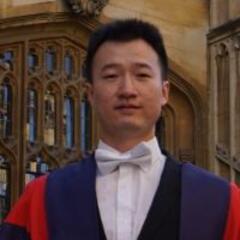Research Associates

Xudong Tao received his bachelor’s degree (2016) from the University of Manchester and then a master’s degree (2017) from Imperial College London. Afterwards, he moved to Oxford for his PhD degree. At Oxford, he was supervised by Professor Hazel Assender, investigating the roll-to-roll manufacture of flexible/wearable thin-film electronics (e.g. thermoelectric generators). After receiving his doctoral degree (2021), he started a postdoctoral project studying the HiTUS technique at Oxford in collaboration with Plasma Quest Ltd. At Cambridge, Xudong works as a research associate in the Bioelectronics Laboratory since 2022 focusing on an implantable drug delivery device for brain tumours.

Marco Vinicio Alban-Paccha received his BEng in Mechatronics Engineering (2013) from the Armed Forces University – ESPE (Quito, Ecuador) and his MEng in Micro/Nano Systems (2018) from Korea University (Seoul, Korea), where he worked on OLED material optimization. He then moved to the Korea Advanced Institute of Science and Technology (Daejeon, Korea), where he received his PhD in Electrical Engineering (2022) advised by Prof. Seunghyup Yoo. Marco's doctoral research was on the use of thin dry electrodes and wearable electronics for cardiovascular sensing. Currently, Marco is doing postdoctoral research at the University of Cambridge in the area of wearable sensors as part of the ADVANTAGE research consortium, part of the UK Advanced Pain Discovery Platform for monitoring and treatment of pain. Together with the Pain Group in the Department of Anaesthesia, he aims to develop wearable and ML-powered solutions to detect, classify, and predict pain episodes in humans.

Silan Zhang received her master's degree in Materials Physics and Chemistry from University of Chinese Academy of Sciences in 2018. She then went on to earn a PhD from Linkoping University in 2023 in Applied Physics. During her PhD, she was focused on the working mechanisms of organic electrochemical transistors. Currently, she is a VR (Swedish Research Council) international postdoc fellow at the University of Cambridge, where she is focusing on the charges transport kinetics within mixed ionic-electronic semiconductors.

Zixuan (Henry) Lu received his Bachelor’s degree (BSc) in Materials Science and Engineering from the University of California, Los Angeles (UCLA) and Master’s degree (MRes) in Nanomaterials from Imperial College London. He pursued his PhD in Biotechnology at the University of Cambridge receiving guidance from Professor Róisín M Owens, where he developed organic electronic devices for integrating with lipid bilayers and native cell membranes, with applications in drug screening and virus detection. After receiving his PhD degree in 2023, he began his first postdoctoral research focused on developing bioelectronic brain-nose model. In 2025, he started his postdoctoral research at Bioelectronics Laboratory centring on using biohybrid neuro-implants for treating Parkinson’s disease.

Morgane Colom holds a BSc in Cognitive Sciences (2015) from the University Lumière Lyon II and an MSc in Neuroscience, Animal Behaviour and Cognition (2017) from the University Toulouse Paul Sabatier in France. She received her Ph.D (2023) in Behavioural Neuroscience from the Open University (Milton Keynes, UK) in Dr Bryan Singer’s lab, where she investigated the relationship between individual variation in motivated behaviour and alterations in accumbal synaptic plasticity in rodents. She first joined the University of Cambridge in 2023 as a member of Prof. Amy Milton’s group in the Dept. of Psychology, with additional mentorship from Prof. Trevor Robbins; her postdoctoral research focussed on characterising the effect of dopaminergic agents on striatal dopamine signalling and motivation deficits. As a Research Associate in the Bioelectronics Lab, Morgane conducts in vivo validation of biohybrid neural implants designed to restore neurological function in rodent models of neurodegenerative disorders.

Yunxia (Sandy) Jin received her PhD degree in Materials Science and Engineering from Fudan University, China advised by Prof. Fei Xiao, with joint PhD training at University of California, Los Angeles (UCLA) advised by Prof. Qibing Pei. During her stay at Fudan University, her research mainly focused on silver nanowire-based transparent composite electrodes, for which she was awarded three research grants. She had postdoc training at National University of Singapore with Prof. John Ho and Prof. Chwee Teck Lim, where she developed high-density brain interface with non-modified electrodes resolving highly-packed neurons, and wireless nerve modulator featuring a new integrated device design that achieved mechanical matching and compression-free performance. At the Bioelectronics lab, she aims to develop multifunctional soft electronics for next-generation neural interfaces with a particular interest in gut-brain interactions.
